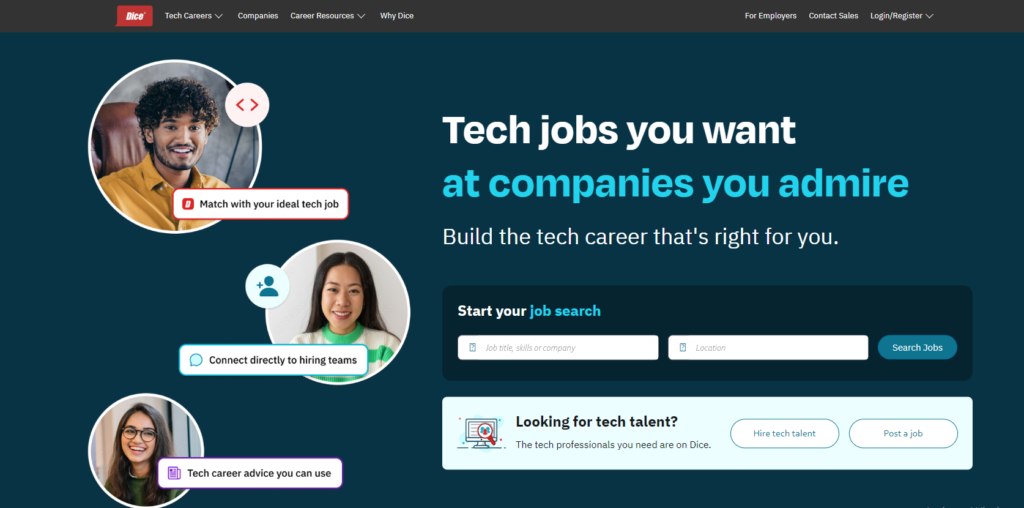
Are you tired of sifting through countless generic job boards, desperately searching for that perfect position in your specialized field? Imagine a place where every job listing speaks directly to your expertise, where employers in your niche industry are eagerly seeking professionals just like you. This isn’t a pipe dream – it’s the power of a paid job board tailored to your specific industry. And here’s the kicker: you could be the one to create it.
Launching a paid job board for a niche industry isn’t just about connecting job seekers with employers; it’s about building a thriving community, establishing yourself as an industry leader, and yes, potentially creating a lucrative business venture. Whether you’re a seasoned professional looking to give back to your industry or an entrepreneur with a keen eye for market gaps, this guide will walk you through the process of creating a job board that stands out in the crowded digital landscape.
In this comprehensive post, we’ll dive deep into the strategies, tools, and insider tips you need to successfully launch and grow a paid job board. From identifying your niche to monetizing your platform, we’ve got you covered. So, buckle up and get ready to transform your industry’s job market – and perhaps your own career along the way.
TL;DR
- Identify a specific niche industry with high demand for specialized job listings
- Research your target audience and competitors thoroughly
- Choose the right job board software or platform for your needs
- Develop a unique value proposition to stand out from generic job boards
- Create a user-friendly website with intuitive navigation and mobile optimization
- Implement a robust pricing strategy for both employers and job seekers
- Focus on building a strong brand and establishing industry partnerships
- Utilize content marketing and SEO to attract organic traffic
- Leverage social media and email marketing for community building
- Continuously gather feedback and improve your platform to ensure long-term success
Understanding the Niche Job Board Landscape
Before diving into launching your paid job board, it’s crucial to understand the current state of niche job boards and why they’re becoming increasingly popular. In today’s hyper-specialized job market, generic job boards often fall short in connecting highly skilled professionals with the right opportunities.
Niche job boards fill this gap by catering to specific industries, skill sets, or even geographical locations. They offer a more focused and efficient job search experience for both employers and job seekers. For instance, a job board dedicated to renewable energy professionals would attract companies looking for solar panel technicians, wind farm managers, and sustainability consultants – roles that might get lost in the sea of listings on a general job site.
Example: Dice.com for tech professionals, eFinancialCareers for finance jobs, and Health eCareers for healthcare positions are successful examples of niche job boards.

Identifying Your Niche and Target Audience
The first step in launching a successful paid job board is identifying the right niche. This involves more than just picking an industry you’re familiar with – it requires thorough market research and analysis.
Steps to Identify Your Niche:
- Analyze industry trends and job market data
- Identify underserved sectors with high demand for specialized talent
- Assess the competition in potential niches
- Consider your own expertise and network in various industries
- Evaluate the potential for growth and profitability
Once you’ve identified your niche, it’s time to dive deep into understanding your target audience. Who are the job seekers in this industry? What are their pain points when job hunting? On the flip side, what challenges do employers face when trying to fill specialized positions?
Tools for market research:
- Google Trends: To analyze industry interest over time
- LinkedIn Insights: For understanding job market trends
- Industry reports from sources like IBISWorld or Statista
Example: Let’s say you’re considering a job board for the renewable energy sector. Using Google Trends, you might notice increasing search interest in “solar energy jobs” over the past five years, indicating a growing market.
Choosing the Right Job Board Software
With your niche and audience defined, the next crucial step is selecting the right technology to power your job board. The platform you choose will play a significant role in the functionality, user experience, and scalability of your job board.
Popular Job Board Software Options:
- WordPress with job board plugins (e.g., WP Job Manager)
- Dedicated job board platforms (e.g., Jobboard.io, Smart Job Board)
- Custom-built solutions for unique requirements
Comparison of popular options:
WordPress + WP Job Manager
- Pros: Highly customizable, low initial cost
- Cons: Requires more technical knowledge
- Example: The Muse uses a customized WordPress solution
Jobboard.io
- Pros: Easy to set up, modern design
- Cons: Less customizable than WordPress
- Example: Remote.co uses Jobboard.io for their remote job listings
Custom solution
- Pros: Fully tailored to your needs
- Cons: Higher cost, longer development time
- Example: Dice.com uses a custom-built platform for advanced features
When evaluating software options, consider factors such as:
- Ease of use for both employers and job seekers
- Customization options to match your brand
- Integration capabilities with other tools (e.g., ATS, payment gateways)
- Mobile responsiveness
- SEO features
- Pricing and scalability
Developing Your Unique Value Proposition
To stand out in the competitive job board market, you need a strong unique value proposition (UVP). Your UVP should clearly communicate why employers and job seekers should choose your platform over others.
“The secret of success is to do the common thing uncommonly well.” – John D. Rockefeller Jr.
This quote perfectly encapsulates the essence of creating a successful niche job board. While job boards are common, doing it exceptionally well for a specific industry can set you apart.
Elements of a Strong UVP for a Niche Job Board:
- Industry-specific features (e.g., skill assessments, portfolio showcases)
- High-quality, pre-screened job listings
- Access to a community of industry professionals
- Industry news and career development resources
- Partnerships with relevant professional associations
Tool suggestion: Use the Value Proposition Canvas by Strategyzer to define your UVP.
Example UVP: “TechTalentHub: Connecting AI specialists with cutting-edge startups through skill-based matching and exclusive industry insights.”
Building Your Job Board Website
With your software chosen and UVP defined, it’s time to bring your job board to life. The design and functionality of your website will play a crucial role in attracting and retaining users.
When creating your job board website, it’s crucial to consider not only the technical aspects but also the content that will provide value to your users. One important topic for both employers and job seekers is understanding the hiring process, especially for startups and small businesses.
This video, “Hiring Tips – Who Should Be Your FIRST Employee?”, offers valuable insights for employers who are just starting to build their teams. By including such content, you’re not only providing job listings but also offering educational resources that can help both employers and job seekers navigate the hiring process more effectively.
For More Free Videos, Subscribe to the Rhodes Brothers YouTube Channel.
Key Considerations for Your Job Board Website:
- User-friendly interface for both employers and job seekers
- Clear and intuitive navigation
- Mobile optimization for on-the-go access
- Fast loading times to reduce bounce rates
- Secure and reliable hosting
- Integration of your brand identity throughout the site
Tools for website building:
- Web hosting: AWS, DigitalOcean, or Cloudflare for reliable hosting
- Analytics: Google Analytics for tracking user behavior
- Heat mapping: Hotjar for understanding user interaction with your site
Example: Use Hotjar to identify which parts of your job listing pages users spend the most time on, and optimize these areas for better engagement.
Implementing a Pricing Strategy
As a paid job board, your pricing strategy is crucial to your success. You’ll need to strike a balance between generating revenue and providing value to your users.
Common Pricing Models for Job Boards:
- Pay-per-post: Employers pay a fee for each job listing
- Subscription-based: Employers pay a recurring fee for unlimited postings
- Freemium: Basic listings are free, with premium features available for a fee
- Job seeker access fees: Charging job seekers for premium access or features
When setting your prices, consider factors such as:
- The average salary range in your niche industry
- Competitor pricing
- The perceived value of your platform
- Your operational costs
Tools for pricing analysis:
- PriceIntelligently: For data-driven pricing decisions
- Google Surveys: To gauge willingness to pay in your target market
Example pricing structure:
- Basic: $199/month for up to 5 job postings
- Pro: $499/month for up to 20 job postings + featured listings
- Enterprise: Custom pricing for unlimited postings + API access
Marketing Your Niche Job Board
Even the best job board won’t succeed without effective marketing. Develop a comprehensive marketing strategy to attract both employers and job seekers to your platform.
Effective Marketing Strategies for Niche Job Boards:
- Content marketing: Create valuable industry-specific content to attract organic traffic
- SEO optimization: Focus on industry-specific keywords to improve search rankings
- Social media marketing: Engage with your audience on platforms where they’re most active
- Email marketing: Build a subscriber list for job alerts and industry news
- Partnerships with industry associations and influencers
- Paid advertising targeting specific job titles or companies in your niche
Marketing tools:
- SEO: Ahrefs or SEMrush for keyword research and optimization
- Email marketing: Mailchimp or ConvertKit for newsletters and job alerts
- Social media: Buffer or Hootsuite for scheduling posts
Example campaign: Create a “State of [Your Niche] Jobs” annual report using data from your platform. Promote it through targeted LinkedIn ads to reach hiring managers in your industry.
Building a Community Around Your Job Board
A successful niche job board is more than just a listing of jobs – it’s a community hub for industry professionals. By fostering a sense of community, you’ll increase user engagement and loyalty.
Ways to Build Community:
- Host virtual networking events
- Create a forum or discussion board for industry topics
- Offer mentorship programs
- Provide career development resources and webinars
- Showcase success stories from your platform
Community-building tools:
- Slack or Discord for creating an industry chatroom
- Zoom or Google Meet for hosting virtual events
- Mighty Networks for building a dedicated community platform
Example: Host monthly “Ask Me Anything” sessions with industry leaders, exclusively for your job board members.
Continuous Improvement and Scaling
Launching your job board is just the beginning. To ensure long-term success, you’ll need to continuously gather feedback, analyze data, and improve your platform.
Areas for Ongoing Improvement:
- User experience based on feedback and usage data
- New features and functionality to stay competitive
- Expansion into related niches or geographical areas
- Partnerships and integrations to add value for users
- Performance optimization for faster load times and better SEO
Analytics and improvement tools:
- Mixpanel for detailed user behavior analysis
- UserTesting for gathering qualitative feedback
- A/B testing tools like Optimizely for refining features
Example: Use A/B testing to compare two different job application processes, measuring which leads to higher completion rates.
By following these steps and continuously refining your approach, you’ll be well on your way to building a successful paid niche job board that provides value to both employers and job seekers in your chosen industry.
Actionable Steps in Niche Job Board Launch
For Young Professionals (20-35):
- Focus on mobile-first design
- Integrate with social media platforms
- Offer skill-based matching
- Provide career development resources
For Mid-Career Professionals (35-50):
- Emphasize advanced search filters
- Offer confidential job searches
- Provide salary insights and negotiations tools
- Include management and leadership positions
For Senior Executives (50+):
- Highlight executive-level opportunities
- Offer discreet networking features
- Provide board member and advisory roles
- Include retirement transition resources
For Career Changers:
- Offer skills transferability assessments
- Provide industry transition guides
- Feature success stories of career pivots
- Offer mentorship matching
For Remote Workers:
- Implement location-independent job filters
- Provide remote work readiness assessments
- Offer resources on managing remote teams
- Include global job opportunities
For Freelancers/Contractors:
- Include project-based work listings
- Offer tools for managing multiple gigs
- Provide resources on taxes and benefits for independents
- Feature client review systems
Common Mistakes to Avoid in Niche Job Board Launch
Choosing a niche that’s too broad or too narrow
- Solution: Conduct thorough market research. Use tools like Google Trends and industry reports to find a niche with sufficient demand but limited competition. Test your niche with a minimum viable product before full launch.
Neglecting mobile optimization
- Solution: Adopt a mobile-first design approach. Use responsive design frameworks and regularly test your site on various devices. Implement Accelerated Mobile Pages (AMP) for faster loading on mobile devices.
Overcomplicating the user interface
- Solution: Follow the principle of progressive disclosure. Start with a simple, intuitive interface and gradually introduce advanced features. Conduct user testing to ensure ease of use.
Setting prices too high or too low
- Solution: Research competitor pricing and conduct surveys to gauge willingness to pay. Implement a tiered pricing structure to cater to different user needs. Consider a freemium model to attract users initially.
Focusing solely on job listings without building community
- Solution: Integrate community-building features like forums, webinars, and networking events. Provide valuable content such as industry insights and career development resources to keep users engaged.
Ignoring SEO best practices
- Solution: Implement a comprehensive SEO strategy. Focus on long-tail keywords relevant to your niche. Regularly produce high-quality, relevant content. Ensure proper site structure and meta tags.
Failing to provide value beyond job postings
- Solution: Offer additional services like resume reviews, career coaching, or skill assessments. Create industry-specific resources and guides. Partner with relevant organizations to provide exclusive benefits to your users.
Neglecting customer support and user feedback
- Solution: Implement a robust customer support system with multiple channels (e.g., chat, email, phone). Regularly conduct user surveys and act on feedback. Consider creating a user advisory board for ongoing input.
Not adapting to changing industry trends
- Solution: Stay informed about industry developments through continuous research. Regularly update your platform with new features and technologies. Attend industry conferences and network with thought leaders.
Underestimating the importance of data security and privacy
- Solution: Implement strong security measures like SSL encryption and regular security audits. Develop a clear privacy policy and ensure GDPR compliance. Consider obtaining relevant security certifications to build trust.
Statistics and Research
The Global Online Recruitment Platform Market is projected to reach USD 73.11 billion by 2027 from USD 39.04 billion in 2021, at a CAGR 11.01% during the forecast period.
Frequently Asked Questions
How much does it cost to start a niche job board?
The cost can vary widely depending on your chosen platform and marketing strategy. Using a WordPress plugin or a dedicated job board platform can cost as little as $50-$200 per month, while a custom-built solution could cost $10,000 or more. Additional costs include hosting, domain registration, and marketing expenses.
How long does it take to launch a niche job board?
With a pre-built solution, you could launch in as little as 1-2 weeks. However, for a more comprehensive platform with custom features, allow 2-3 months for development, testing, and initial content creation.
How do I attract employers to my new job board?
Start by leveraging your industry connections and offering introductory rates. Focus on providing exceptional value through targeted candidates and industry-specific features. Use content marketing and partnerships to establish your board as an authority in the niche.
Should I charge job seekers to access listings?
This depends on your niche and value proposition. Many successful job boards keep access free for job seekers to build a large talent pool. Consider offering premium features or services to job seekers instead of charging for basic access.
How can I compete with larger, established job boards?
Focus on your niche expertise and provide a more tailored experience. Offer features and content specific to your industry that larger boards can’t match. Build a strong community around your platform to increase user loyalty.
What are some key metrics I should track for my job board?
Important metrics include the number of active job listings, applicants per job, employer retention rate, job seeker registration rate, and overall site traffic. Also track revenue per listing and customer acquisition cost.
How often should I update my job board software?
Aim for regular updates at least quarterly to fix bugs, improve security, and add new features. Stay responsive to user feedback and industry trends to determine when more significant updates are needed.
Can I run a niche job board as a side business?
Yes, many niche job boards start as side projects. However, be prepared to invest significant time in the early stages for setup, marketing, and community building. As the board grows, you may need to dedicate more resources to management and customer support.
How do I ensure the quality of job listings on my board?
Implement a review process for new listings, use automated tools to detect spam or low-quality posts, and consider offering a “featured” or “verified” status for top employers. Encourage user feedback to help maintain quality.
What legal considerations should I be aware of when starting a job board?
Key legal areas include data privacy (especially if operating internationally), terms of service for both employers and job seekers, and ensuring compliance with employment laws in your operating jurisdictions. Consider consulting with a legal professional familiar with online businesses and employment law.
Your Gateway to Industry Transformation
Launching a paid job board for a niche industry is more than just a business venture – it’s an opportunity to revolutionize how professionals in your field connect with career opportunities. By focusing on the unique needs of your chosen niche, providing exceptional value, and fostering a vibrant community, you can create a platform that becomes indispensable to both employers and job seekers.
Success won’t happen overnight. It requires dedication, continuous improvement, and a deep understanding of your industry’s evolving needs. But with the strategies, tools, and insights we’ve covered in this guide, you’re well-equipped to embark on this exciting journey.
So, are you ready to take the first step towards transforming your industry’s job market? Start by identifying your niche, researching your audience, and mapping out your unique value proposition. The world of niche job boards is waiting for your innovative touch!
Thank you for joining us and checking out this article. For the latest videos and information to help you succeed in your entrepreneurial journey, don’t forget to view and subscribe to the Rhodes Brothers YouTube Channel.
Resource List
Books
- “Platform Revolution” by Geoffrey G. Parker, Marshall W. Van Alstyne, and Sangeet Paul Choudary
- “Lean Startup” by Eric Ries
- “The Art of SEO” by Eric Enge, Stephan Spencer, and Jessie Stricchiola
Courses
- Coursera: “Digital Marketing Specialization” by University of Illinois
- LinkedIn Learning: “Learning Search Engine Optimization (SEO)”
Podcasts
- “Rec Tech” by Chris Russell
- “The Chad & Cheese Podcast” (HR and Recruiting Industry’s Most Dangerous Podcast)
- “Hiring On All Cylinders” by Entelo
Tools
- Job Board Software: Jobboard.io, Smart Job Board, WP Job Manager
- Analytics: Google Analytics, Mixpanel, Heap
- SEO: Ahrefs, SEMrush, Moz Pro
- Email Marketing: Mailchimp, ConvertKit, Constant Contact
- Social Media Management: Hootsuite, Buffer, Sprout Social
- Customer Support: Zendesk, Intercom, Freshdesk
- Payment Processing: Stripe, PayPal, Square
Industry Associations
Blogs and Websites
- ERE.net (Recruiting news and insights)
- JobBoardDoctor.com (Job board industry analysis)
- RecruitingDaily.com (Recruiting trends and technology)
- OnlineRecruitmentMarketing.com (Digital strategies for recruiters)
Conferences
- TAtech Leadership Summit on Recruitment Marketing
- RecBuzz (Online Recruitment Technology event)
Market Research Resources
- IBISWorld (Industry market research)
- Statista (Statistics and market data)
- Bureau of Labor Statistics (Employment data and projections)
Legal Resources
- GDPR.eu (For understanding data protection regulations)
- UpCounsel (Online legal services for businesses)
- LegalZoom (Legal documents and advice for startups)
Niche Job Board Launch Cheat Sheet
- Identify underserved niche with high demand
- Conduct thorough market research
- Define your unique value proposition
- Choose appropriate job board software
- Design user-friendly, mobile-optimized website
- Implement secure payment processing
- Develop content marketing strategy
- Optimize for search engines (SEO)
- Build partnerships with industry associations
- Create social media presence across relevant platforms
- Implement email marketing for job alerts and updates
- Offer exceptional customer support
- Continuously gather and act on user feedback
- Monitor key performance indicators (KPIs)
- Stay updated on industry trends and technologies
- Foster a sense of community among users
- Regularly add new features and improvements
- Ensure data privacy and security compliance
- Develop a pricing strategy that balances value and profitability
- Create a roadmap for scaling and expansion
- Establish a strong brand identity
- Leverage testimonials and success stories
- Offer resources beyond job listings (career advice, industry news)
- Implement a referral program for both employers and job seekers
- Regularly audit and update job listings for quality
- Explore integration possibilities with ATS and HRIS systems
- Consider offering resume review or career coaching services
- Develop a mobile app for on-the-go access
- Host virtual job fairs or networking events
- Implement AI-powered job matching for better results






